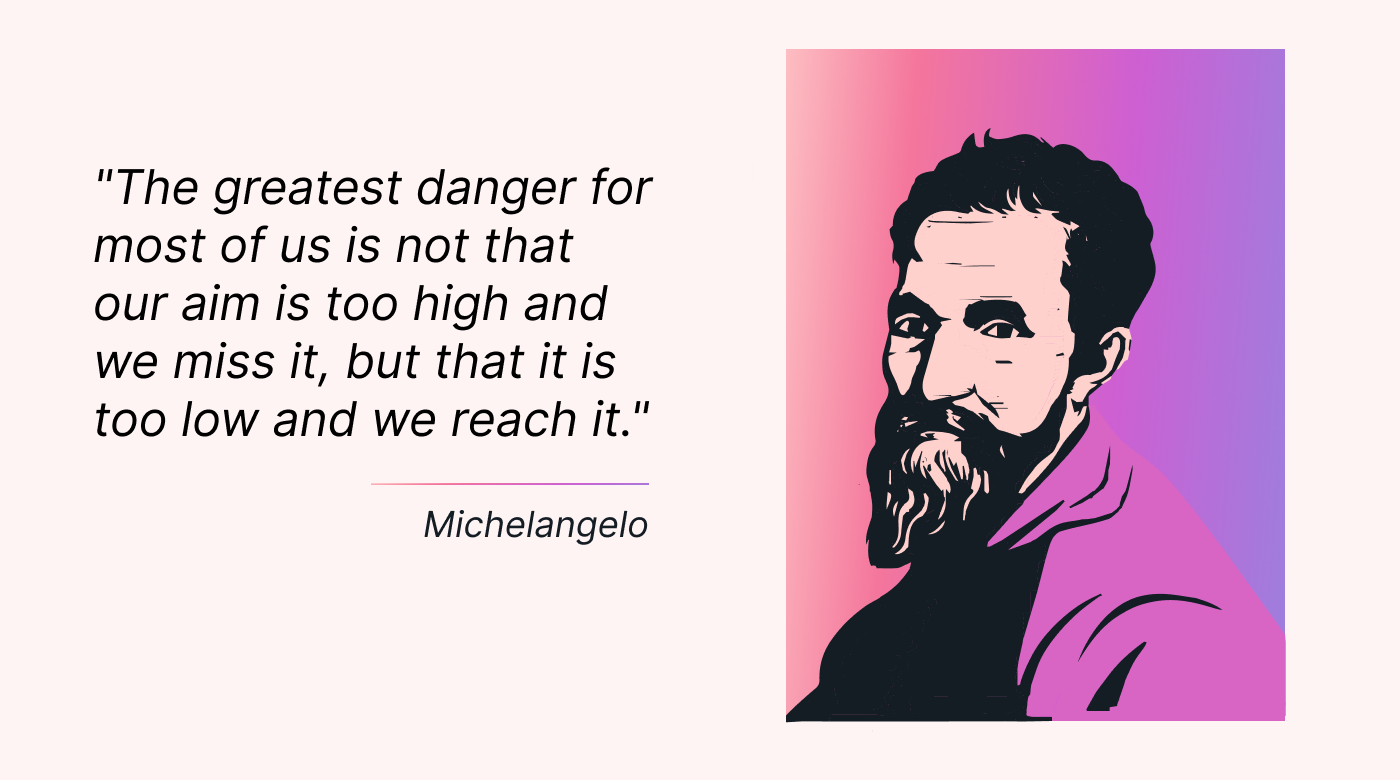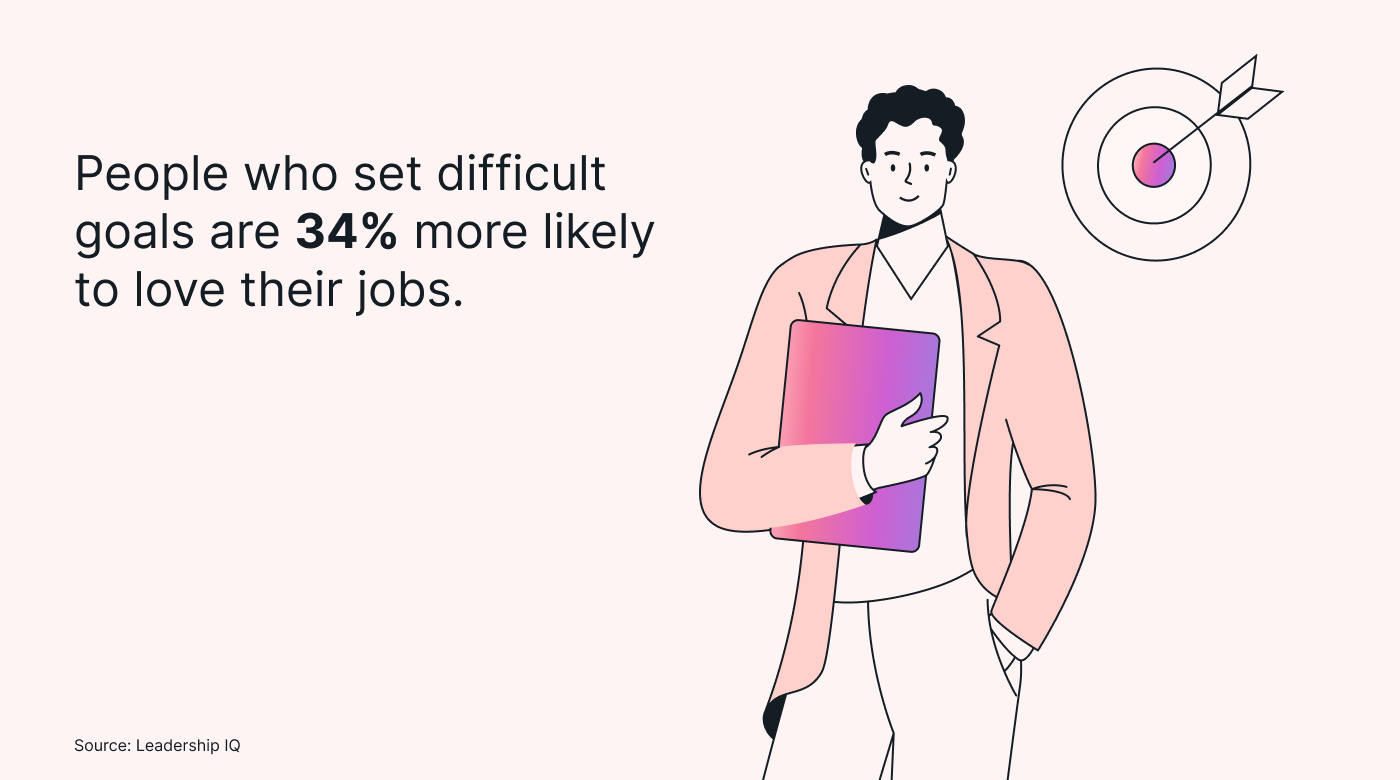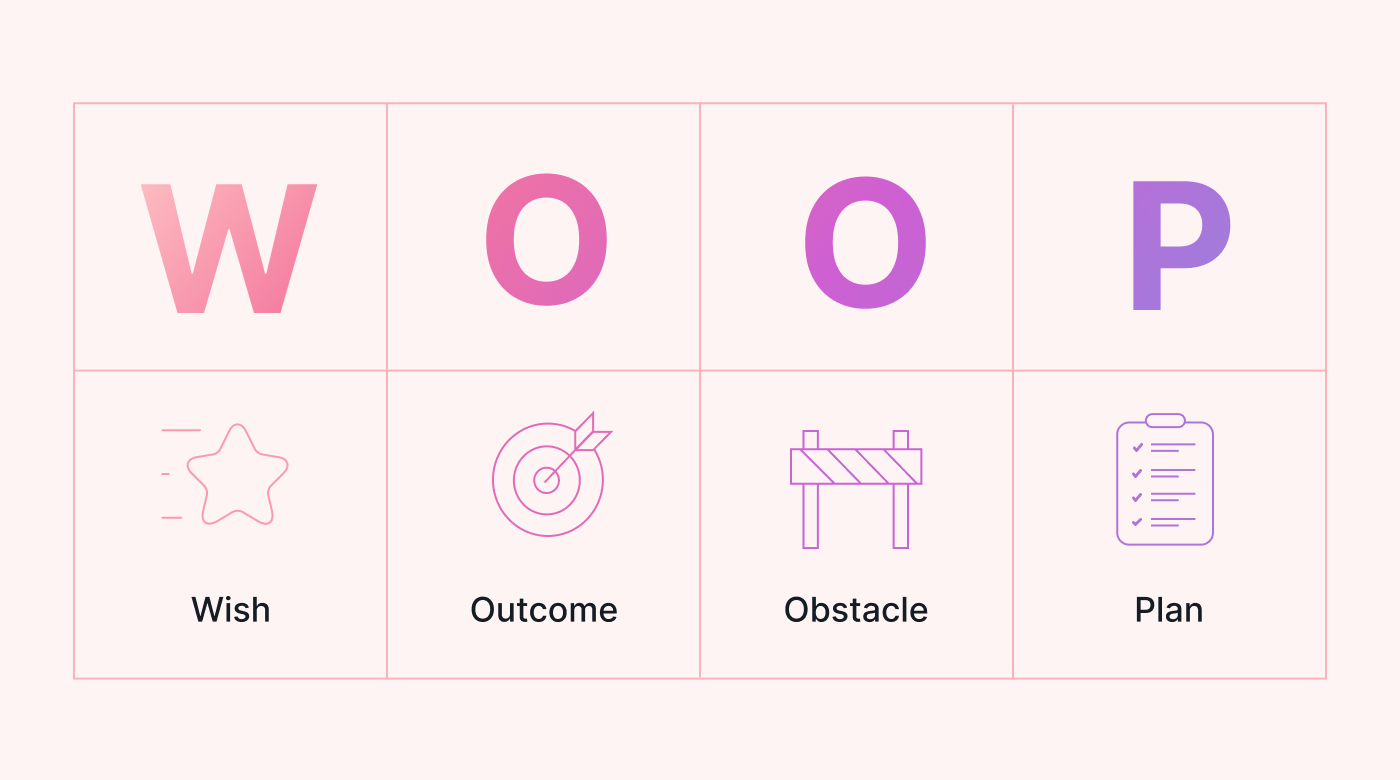If you’ve already set professional development goals for 2025, great. This article will help you hone and improve them.
If you haven’t set work goals yet, no problem. This article will guide you through creating challenging goals you’re more likely to accomplish.
In this post, you’ll learn:
- Why goal setting works
- The psychology behind why goal setting works
- How to use the latest science to achieve your goals
- 3 frameworks through which to formulate your goals
- 7 examples of professional goals for 2025 (and copy-and-paste goal formulas you can steal!)
- 5 goal-setting tips from famous, successful people
- Goal-setting quotes from 9 successful people and 1 Chinese proverb that provide inspiration and guidance
Let’s jump in.
Does goal setting work?
Setting professional goals is a practice many people follow and recommend.
That doesn’t necessarily mean it's an effective practice.
Before we talk about how to set goals, we need to answer a question: Does goal setting actually increase your chances of accomplishing your ambitions and dreams?
Thankfully, there are multiple studies on goal setting we can examine to answer this question.
Setting goals has a psychological impact on the brain. It activates the reticular activating system, which helps us focus and notice opportunities that can lead to goal achievement. Without setting goals, we often lack direction, easily get distracted, and lose motivation.

Goal-setting also encourages us to tap into our intuition and take action toward our desired outcomes. Writing down specific goals helps us turn our thoughts into actions. The more specific we are about what we want to achieve and how we plan to achieve it, the more likely we are to succeed.
While research shows that goal setting is effective, there is a risk to it as well.
A 2021 study discovered that people who set goals and failed to achieve them experienced a decrease in self-esteem and motivation, compared to participants who reached their goals.
Considering this risk, is there a way to carefully set goals we’re more likely to achieve? That way, we can experience the benefits of goal setting and avoid any negative outcomes of unreached professional goals.
Yes. Psychology has answers for us.
The psychology of goal setting: How to set goals you’re more likely to achieve
It turns out that there are strategies you can follow when setting goals to increase your chances of success. Here’s what psychology tells us those strategies are:
Set emotional, meaningful goals
Psychology tells us that your goals should be meaningful to you personally. You’ll feel like the goal is easier to achieve when they are.
This idea stems from Self-Determination Theory (SDT), a well-regarded theory in psychology. According to SDT, intrinsic motivation, which comes from doing something because it’s inherently interesting or enjoyable, is more enduring and effective than extrinsic motivation, which comes from external rewards or pressures. When a goal is personally meaningful, it’s more likely to align with your intrinsic motivations.
Set specific, challenging goals
If your goals are vague and easy, your performance will likely be lower.

To fully unleash your capabilities and experience job satisfaction, it’s important to set goals that push you outside your comfort zone.
In a study of more than 16,000 people, Leadership IQ found that only 43% of participants reported setting difficult goals.
However, those who did set challenging goals were 34% more likely to express a genuine love for their jobs. This suggests that pursuing difficult goals can foster a sense of fulfillment and engagement in our professional lives.

According to the same study, top executives are 64% more likely to set difficult or ambitious goals. This shows the connection between goal difficulty and success at higher levels of leadership. Top executives embrace the challenge of setting ambitious goals, leading to a culture of growth, innovation, and high performance within their organizations.
Consider the timeframe
When it comes to setting goals, one key factor is the timeframe.
While many companies continue to opt for annual goals, quarterly goals are more effective at generating positive results.
One study found that companies that set quarterly performance goals generate 31% greater returns than those that only set annual goals. And companies that set monthly goals see even better results. This shows how shorter time frames and short-term goals provide a sense of urgency, making it easier to stay motivated and focused.
3 frameworks through which to formulate your goals
Let’s delve into three well-known goal-setting frameworks to provide you with a concrete starting point for setting development goals at work.
1. ABC of Goals
Frank L. Smoll, a Ph.D. and psychologist at the University of Washington, says there are three essentials to good goal setting.
He calls this the ABC of Goals, which stands for:
- A — Achievable: Goals should be achievable.
- B — Believable: Goals should be believable.
- C — Committed: You should be committed to your goals.
2. SMART goals
SMART goals are another, more widely used framework for setting and achieving goals. The acronym stands for Specific, Measurable, Achievable, Relevant, and Time-bound.
- Specific: The goal should be clear and specific, answering the questions: what, why and how.
- Measurable: The goal should be measurable so that progress can be tracked and success can be determined.
- Achievable: The goal should be realistic and achievable, taking into account the resources and constraints.
- Relevant: For business goals, the goal should be relevant to the organization and align with its overall mission and strategy. For personal goals, the goal should be relevant to you and align with your overall life mission.
- Time-bound: The goal should have a clear deadline and time frame, with specific milestones to help track progress.
SMART goals
- Specific: The goal should be clear and specific.
- Measurable: The goal should be measurable.
- Achievable: The goal should be realistic and achievable.
- Relevant: The goal should be relevant to you or your company.
- Time-bound: The goal should have a clear deadline and milestones.
3. The WOOP framework
Most of us have been told to visualize ourselves achieving our professional development goals. However, this traditional approach can sometimes backfire.
While positive visualization encourages us to focus on our ideal future, it can sometimes lead to complacency and a reduction in effort. Instead, you can use a technique called mental contrasting.
Mental contrasting involves not only visualizing the desired outcome but also considering the struggles that may prevent us from achieving that goal. Acknowledging and planning for potential obstacles means we can better prepare ourselves for success.
This evidence-based framework developed by Professor Gabriele Oettingen is known as WOOP:

- Wish: Clearly define the specific goal you want to achieve in your professional life.
- Outcome: Visualize the positive outcome of achieving that goal, focusing on the benefits and rewards it will bring.
- Obstacle: Identify the potential obstacles or challenges that may arise along the way.
- Plan: Develop a concrete and actionable plan to overcome those obstacles and continue toward your goal.
Implementing the WOOP framework can help you ground your professional dreams and turn them into actionable steps.
7 examples of professional goals for work in 2025 (and copy-and-paste goal formulas you can steal!)
Navigating the path to professional growth requires a strategic approach. Each goal, whether related to your personal growth or professional success, will benefit from having a structured formula.
Here are five goal examples paired with easy-to-follow formulas to guide you in articulating your aspirations:
1. Help your company reach a goal
Helping your company reach a business goal can put you on a path to promotion or a raise.
Here’s a simple formula you can use to formulate a business goal:
Goal formula
[Insert relevant positive business outcome] by [insert specific number] within [insert goal deadline] by [specific strategy to accomplish goal].
Example goal
Imagine you're a salesperson. Here’s how you might use the above formula:
Increase sales by 15% within the next six months by implementing a targeted marketing campaign and offering promotions to current customers.
2. Obtain a professional certification
Acquiring a professional certification is another way you could get a promotion or raise, as well as further your skills and increase your job opportunities.

Goal formula
Obtain [insert name of specific certification] by [insert date] by [insert what you must do to obtain this certification].
Example goal
Obtain Digital Marketer’s Email Marketing Certification by 9/1/23 by watching all of the course materials and passing the final exam.
3. Grow your network
Working on your networking skills and forming new professional relationships can lead to job and career opportunities. Attending an industry event, for instance, whether it’s a virtual or in-person event, can help you meet potential mentors and mentees.
Goal formula
Build a professional network of at least [insert number of contacts] in [insert your industry or area of expertise] by [insert specific, measurable actions you’ll take to grow your network] by [insert deadline].
Example goal
Build a professional network of at least 50 contacts in the digital, inbound marketing industry by attending five local networking events and building a list of contacts on Twitter and LinkedIn and messaging them by [insert deadline].
4. Increase income or get a promotion
Setting a goal to get a raise or promotion at your current company can be tricky, because it’s not entirely in your control.
You could be a high achiever who meets or exceeds the expectations your manager sets. Yet, your manager or employer might still decide to pass you up for a promotion.
That’s why I recommend, when setting this goal, to consider multiple ways to achieve your goal, some that don’t force you to rely on your current company.
For example:
Goal formula
Increase my income by [insert specific number] by [insert deadline] by [insert a few methods/strategies for increasing your income].
Example goal
Increase my income by 10% by [insert deadline] by doing one of the following:
- Meeting with my boss on [insert deadline] and asking for specific, measurable actions I must take to get a 10% promotion by [insert deadline], and then creating a goal to accomplish this.
- Starting a side hustle business that increases my income by 10%.
- Interviewing for and getting hired at a new job that pays me 10% more.
5. Enhance your emotional intelligence and leadership skills
Gaining an in-demand, high-value skill can help you increase your income, launch a side hustle, or get a promotion or raise. Plus, learning new skills will give you a feeling of accomplishment. Setting goals that require learning new skills is nearly 10 times more powerful at inspiring employees.
An important soft skill in today’s workplace is emotional intelligence. Understanding and managing emotions is crucial for effective leadership, as it helps leaders navigate complex interpersonal dynamics, motivate their teams, resolve conflicts, and build trust among their team members.
Goal formula
Improve my emotional intelligence and leadership skills by [insert deadline] by [insert specific actions or courses to take].
Example goal
Enhance my emotional intelligence and leadership capabilities by [insert deadline] by attending a bi-weekly emotional intelligence workshop and reading three leadership-focused books.
6. Strengthen active listening and communication skills
Clear communication is the backbone of effective team collaboration.
Active listening, on the other hand, ensures that messages are received and understood as intended, leading to fewer mistakes and misunderstandings. Together, clear communication and active listening play a pivotal role in building trust and ensuring smooth operations within a team. This makes both of them great professional development goals for work.
Goal formula
Enhance my communication and active listening skills by [insert deadline] by [insert specific courses, methods, or activities to participate in].
Example goal
Strengthen my communication and active listening abilities by [insert deadline] by joining a weekly communication workshop and practicing active listening during team meetings.
7. Develop time management skills
Mastering time management skills can be a life-changer. Effective time management ensures that work tasks are completed efficiently, leaving room for your personal life and recreation. Allocating specific time slots for different activities can also reduce stress levels.
A well-managed schedule means fewer last-minute scrambles, missed deadlines, and burnouts, creating a more balanced and healthy work-life equilibrium.
Goal formula
Refine my time management skills by [insert deadline] by [insert specific strategies, tools, or courses to employ].
Example goal
Boost my time management prowess by [insert deadline] by using the Pomodoro Technique for task breakdown and attending a monthly time management seminar.
Goal-setting quotes from 9 successful people and 1 Chinese proverb that provide inspiration and guidance
Let’s wrap this article up with inspiring, helpful quotes from people who have already achieved amazing goals and results.
Create a plan
"A goal without a plan is just a wish." - Antoine de Saint-Exupéry
Set goals
"Setting goals is the first step in turning the invisible into the visible." - Tony Robbins
Make ambitious goals
"The greatest danger for most of us is not that our aim is too high and we miss it, but that it is too low and we reach it." - Michelangelo
Find work you love
"The only way to do great work is to love what you do. If you haven’t found it yet, keep looking. Don’t settle. As with all matters of the heart, you’ll know when you find it." - Steve Jobs
Decide you won’t stay where you are
"The first step towards getting somewhere is to decide that you are not going to stay where you are." - J.P. Morgan
Don’t be afraid to take risks and action
"You miss 100% of the shots you don't take." - Wayne Gretzky
Never doubt yourself
"The only limit to our realization of tomorrow will be our doubts of today." - Franklin D. Roosevelt
Goals give us something to aim for
"A goal is not always meant to be reached, it often serves simply as something to aim at." - Bruce Lee
It’s never too late to set goals
"You are never too old to set another goal or to dream a new dream." - C.S Lewis
Start now
"The best time to plant a tree was 20 years ago. The second-best time is now." - Chinese Proverb
That’s a wrap! (Plus, a tool to help you achieve your goals)
We covered a lot on goal setting in this article, but here are a few key takeaways:
- Setting goals is a scientifically proven way to increase your chances of reaching your desired outcomes.
- Write down your goals and share them with a friend.
- Send your friend regular progress reports and ask for their feedback on your goals.
- Use the SMART formula as a structure when you create goals.
- The best time to start working on a goal is now. Prioritize action.
And if you want to create a detailed plan to start working towards your goals, get the Motion app.
Using AI and automation, Motion takes all of your tasks , projects, and goals and creates a plan to get them done by deadline.
Plus, Motion encourages you to use the SMART formula for each goal and task. For every task, project, or goal, Motion allows you to document:
- Details about your task/goal (Specific)
- The results you’re seeking to achieve (Measurable)
- The goal’s attainability (Achievable)
- The relevance of the task to your business (Relevant)
- A start date and deadline (Time bound)
And it ensures your goals are achievable by calculating when you won’t hit a deadline given all of your priorities and working hours.
30,000+ professionals use Motion to achieve their goals and finish work faster. Try the Motion app for free for 7 days.





